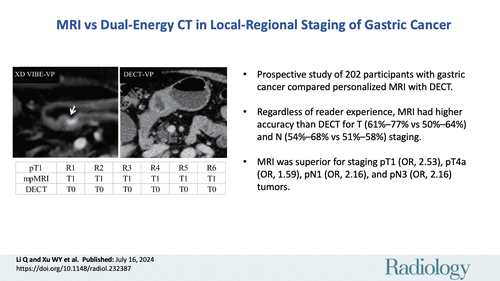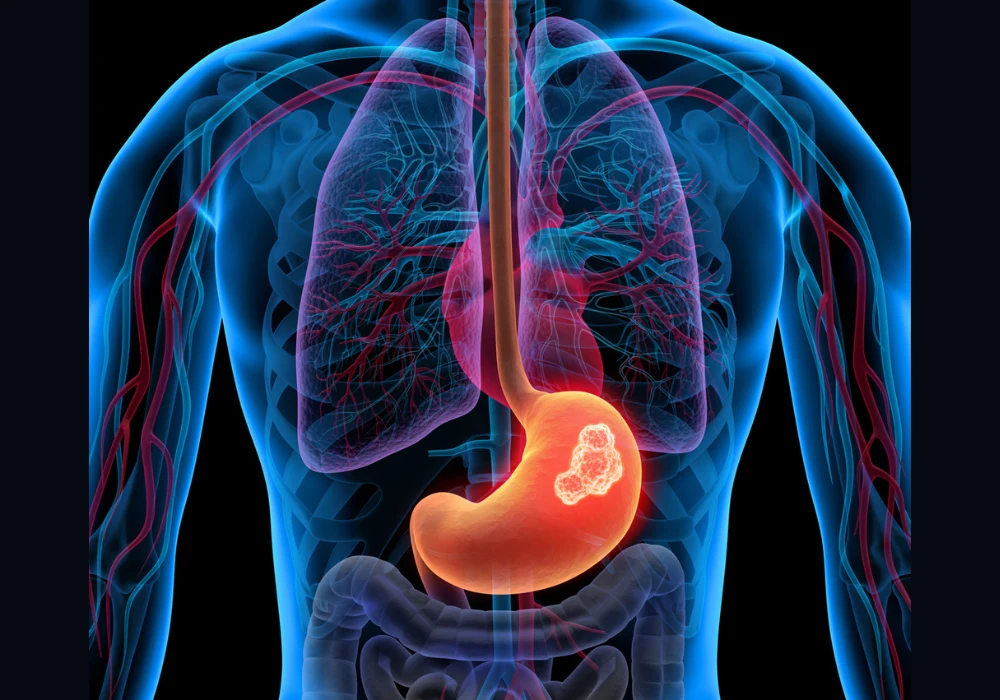Preoperative local-regional tumour staging is crucial for effective treatment planning in gastric cancer (GC). Accurate staging determines the course of treatment, significantly impacting patient outcomes. This article delves into a recent noninferiority study comparing the diagnostic accuracy of personalised multiparametric MRI (mpMRI) against dual-energy computed tomography (DECT) for local-regional T and N staging in GC patients. A recent study published in Radiology highlights the superior accuracy of mpMRI, presenting compelling evidence for its preference over DECT in clinical practice.
Higher Accuracy of mpMRI for T and N Staging
The study included 202 participants with gastric cancer, all undergoing both mpMRI and DECT before gastrectomy with lymphadenectomy. Six radiologists independently assessed the T and N stages of the tumours using both imaging modalities. Results showed that mpMRI demonstrated higher accuracy for both T staging (61-77%) and N staging (54-68%) compared to DECT (50-64% for T staging and 51-58% for N staging), irrespective of the radiologist's experience. This consistency underscores the robustness of mpMRI in providing reliable diagnostic information. Specifically, mpMRI achieved superior accuracy in identifying T1 (83% vs 65%) and T4a tumours (78% vs 68%), as well as N1 (41% vs 24%) and N3 nodules (64% vs 45%).

Image Credit: RSNA Radiology
Superior Performance in Specific Tumour Stages
The detailed analysis revealed that mpMRI outperformed DECT significantly in certain tumour stages, which has important clinical implications. For instance, in T1 staging, mpMRI was 18% more accurate than DECT, and for N3 staging, it was 19% more accurate. These differences are critical as accurate staging can influence treatment decisions, potentially allowing patients with early-stage T1 N0 tumours to avoid neoadjuvant therapy and its associated toxicity. Additionally, precise staging of advanced tumours, such as unresectable T4 tumours, can prevent unnecessary surgical interventions, thereby sparing patients from invasive procedures that offer no therapeutic benefit.
Clinical Relevance and Implications
The higher diagnostic accuracy of mpMRI has significant clinical relevance. Accurate staging is essential for tailoring the appropriate treatment strategy for each patient. For patients with T1 N0 tumours, avoiding neoadjuvant therapy can reduce exposure to harmful side effects and improve quality of life. Conversely, for patients with advanced, unresectable T4 tumours, accurate staging with mpMRI can prevent futile surgeries, allowing for more appropriate palliative care measures. This precision in staging can also guide the use of targeted therapies and other advanced treatment options, enhancing overall patient outcomes.
This study convincingly demonstrates that personalised mpMRI offers superior accuracy over DECT for local-regional staging of gastric cancer. The findings suggest that mpMRI should be preferred in clinical practice for staging GC due to its higher accuracy, particularly in early and advanced stages of the disease. While the study does acknowledge potential limitations such as patient selection and recall bias, the overall evidence supports the integration of mpMRI into routine diagnostic protocols for gastric cancer. Future research might focus on further validating these findings across diverse patient populations and comparing mpMRI with other imaging modalities like endoscopic ultrasound to continue improving the accuracy and efficacy of GC staging.
Source: RSNA Radiology
Image Credit: iStock






